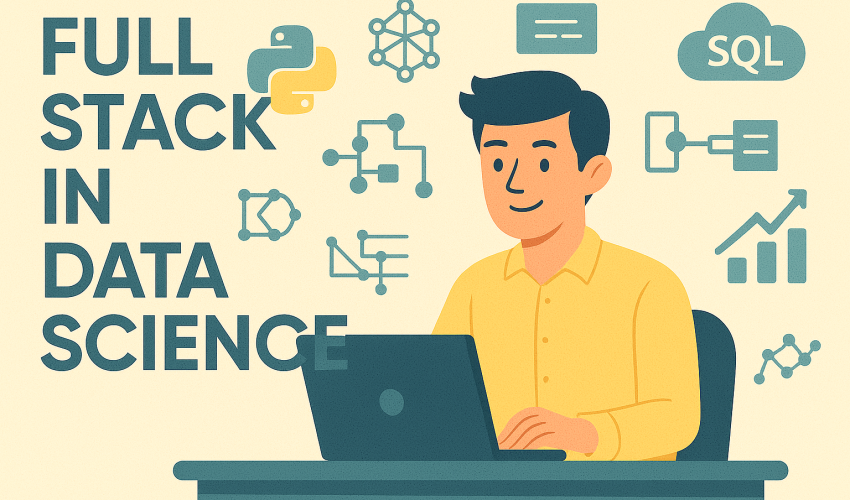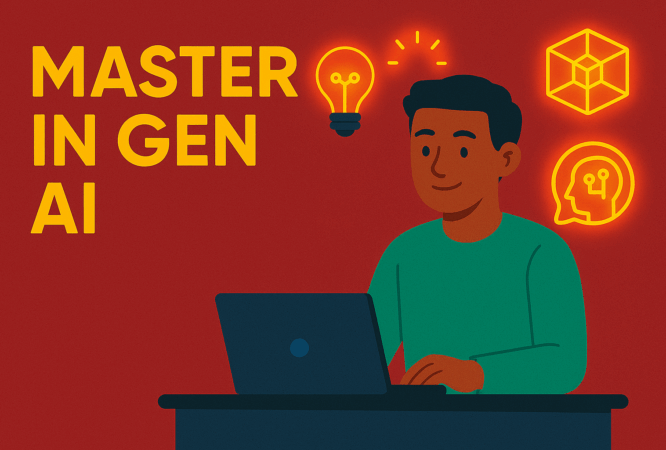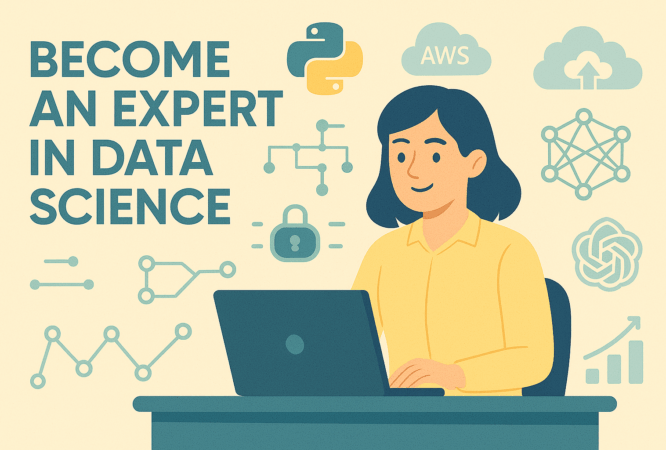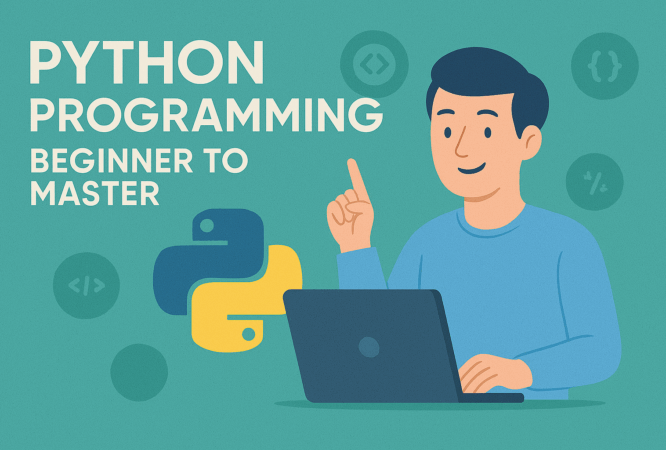Full Stack in Data Science

About the Course
This comprehensive Data Science Course is designed to equip learners with the essential skills and knowledge required to excel in the rapidly growing field of data science. From foundational mathematics and statistics to advanced machine learning and deep learning techniques, this program covers the complete data science workflow.
Students will gain hands-on experience with industry-standard tools and technologies including Python, SQL, machine learning frameworks, and data visualization libraries. Through real-world projects and case studies, learners will develop the practical skills needed to extract actionable insights from complex datasets.
Key outcomes include mastering data collection and preprocessing, exploratory data analysis, statistical modeling, machine learning algorithms, and the ability to communicate findings effectively to both technical and non-technical stakeholders.
Foundational understanding of data science concepts, applications, and the data science process.
- Overview and applications of Data Science
- The role of a Data Scientist
- Understanding the Data Science process
Essential mathematical and statistical foundations required for data science applications.
- Basic algebra, calculus, and linear algebra
- Probability and statistics fundamentals
- Distributions, hypothesis testing, and statistical inference
Learn various techniques for collecting, cleaning, and preparing data for analysis.
- Data types and data structures
- Techniques for data collection (web scraping, APIs, databases)
- Data cleaning and preprocessing (handling missing data, outliers, etc.)
- Data transformation and feature engineering
Master techniques for understanding data Full Stack through statistical analysis and visualization.
- Descriptive statistics and summary statistics
- Data visualization for EDA (histograms, scatter plots, box plots)
- Identifying trends, patterns, and anomalies
Create compelling and effective visualizations to communicate insights from data.
- Principles of effective data visualization
- Visualization tools and libraries (Matplotlib, Seaborn, Plotly)
- Creating dashboards and reports
Learn Python programming fundamentals specifically tailored for data science applications.
- Python basics: syntax, data types, and control structures
- Functions, loops, and conditional statements
Master the core Python libraries that form the foundation of Full Stack data science work.
- NumPy for numerical computations
- Pandas for data manipulation and analysis
- SciPy for scientific computing
Introduction to machine learning concepts and the machine learning workflow.
- Introduction to machine learning concepts
- Types of machine learning (supervised, unsupervised, reinforcement)
- Data splitting (training, validation, and test sets)
Learn supervised learning algorithms for prediction and classification tasks.
- Regression algorithms (Linear Regression, Logistic Regression)
- Classification algorithms (K-Nearest Neighbors, Decision Trees, SVM)
- Ensemble methods (Random Forest, Gradient Boosting)
Explore unsupervised learning methods for pattern discovery and data exploration.
- Clustering algorithms (K-Means, Hierarchical Clustering)
Introduction to neural networks and deep learning frameworks for complex pattern recognition.
- Introduction to neural networks and deep learning
- Basics of frameworks (TensorFlow, Keras, PyTorch)
Learn comprehensive techniques for evaluating and validating machine learning models.
- Performance metrics (accuracy, precision, recall, F1 score)
- Cross-validation techniques
- Model selection and hyperparameter tuning
Master database concepts and SQL for efficient data storage and retrieval.
- Introduction to Databases
- Database Models
- Relational Databases
- Structured Query Language (SQL) Basics
- Advanced SQL Queries
Learn project management skills specific to data science projects and team collaboration.
- Defining problem statements and project objectives
- Working in Agile teams and project lifecycle
- Documentation and communication of results
Understanding ethical considerations and responsible practices in data science.
- Data privacy and security concerns
- Bias and fairness in data and models
- Ethical guidelines in data collection and decision making
Apply all learned concepts in a comprehensive real-world data science project.
- Selecting a real-world problem
- Applying data science techniques using Python
- Presenting findings and solutions in a final report or presentation
Comprehensive career preparation and industry recognition upon successful course completion.
Job Roles:
- Data Scientist
- Machine Learning Engineer
- Data Analyst
- Research Scientist
- AI/ML Consultant
- Business Intelligence Analyst
- Quantitative Analyst
- Data Engineer
- Statistical Analyst
- Product Data Scientist
Industries:
- Technology and Software
- Finance and Banking
- Healthcare and Pharmaceuticals
- E-commerce and Retail
- Telecommunications
- Automotive and Manufacturing
- Media and Entertainment
- Government and Public Sector
- Consulting and Professional Services
- Research and Development
Career Support:
- Resume Review and Portfolio Development
- Technical Interview Preparation
- Mock Interviews with Industry Experts
- LinkedIn Profile Optimization
- Job Placement Assistance and Networking
- Continuous Learning Resources and Updates
- Alumni Network and Mentorship Programs
- Industry Certification Guidance
techpath
You might be interested in
- Live class
- Beginner
- 29 Students
- 16 lessons
- Live class
- Beginner
- 29 Students
- 10 lessons
- Live class
- Beginner
- 29 Students
- 10 lessons
- Live class
- Beginner
- 29 Students
- 10 lessons
- Live class
- Beginner
- 29 Students
- 10 lessons
Sign up to receive our latest updates
Get in touch
Address





